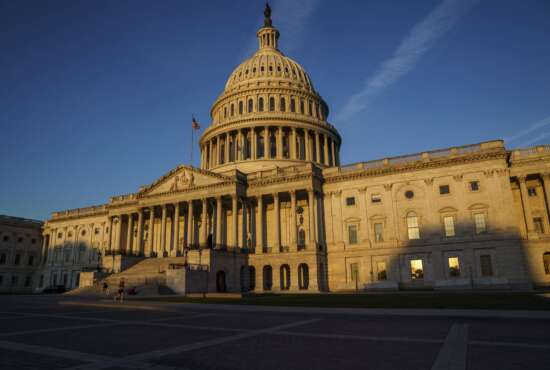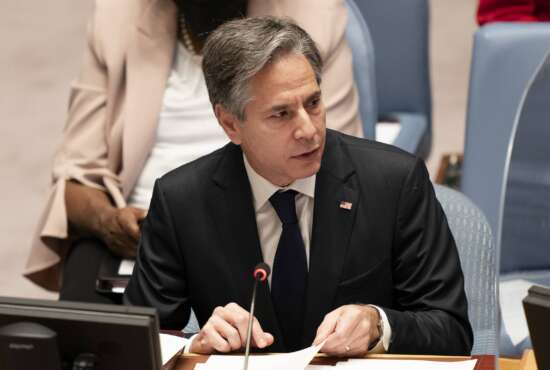Hubbard Radio Washington DC, LLC. All rights reserved. This website is not intended for users located within the European Economic Area.
Biden admin on the hunt for a new Chief Statistician
In today's Federal Newscast, the Office of Management and Budget seeks a Chief Statistician to the Biden administration’s data priorities forward.
To listen to the Federal Newscast on your phone or mobile device, subscribe in PodcastOne or Apple Podcasts. The best listening experience on desktop can be found using Chrome, Firefox or Safari.
- The House-passed defense policy bill includes a few new benefits for federal employees. The 2022 bill would add bereavement as option for which federal employees can take paid leave. And it adds a housing stipend for federal wild land firefighters who live more than 50 miles away from their deployment locations. House members also included a new mental health program for federal firefighters. It would give federal firefighters up to five days of paid time off during fire season. The Senate hasn’t started the amendment process yet for its version of the NDAA. (Federal News Network)
- After more than six years of development, the Army has decided to push back the rollout date for the modernization of its human resources IT systems. Officials said they now plan to fully deploy the Integrated Personnel and Pay System, or IPPS-A, in September of 2022. That’s nine months later than previously planned. The Army said the setback is mainly because of difficulties with integrating the new system with the legacy systems it’s replacing. IPPS-A has already been deployed to the Army National Guard. The newest wave is meant to bring the active duty Army and the Army Reserve into the same system. The Army has spent more than a billion dollars on the project so far.
- The Defense Department has taken a large step to prepare its operations for a world impacted by climate change. The Pentagon is already losing billions of dollars trying to adapt to extreme weather and climate changes in recent years. Now, it is taking climate change into account from leadership decisions to the way it trains and equips troops. That means it is preparing for wars, emergencies and other contingencies in a world where massive hurricanes, huge wildfires and rising sea levels are the norm. In its new strategy, Defense Department also said it will make some efforts to be more transparent about its greenhouse gas contributions and will try to hold its suppliers accountable as well. (Federal News Network)
- Federal agencies have drawn up new plans to prepare their employees and buildings for climate change. 23 agencies released new climate change resiliency plans. They’re in response to an executive order President Biden signed in January. The Department of Homeland Security said it’ll electrify half of its fleet by 2030. The Education Department is looking into cutting IT energy use. And the Office of Personnel Management is working on a new program that would bring climate change experts from the private sector, academia and the non-profit space into agencies. (Federal News Network)
- The Federal Deposit Insurance Corporation is leading a tech sprint focused on how well community banks and other financial institutions can withstand disruptions ranging from hurricanes to ransomware. FDIC has selected six teams of tech companies to measure and test the operational resiliency of banks. The agency will host a demo day later this month … where judges will evaluate presentations from each team. FDIC isn’t awarding any cash prizes as part of the sprint.
- Agencies now have a more mature policy to secure remote workers. Nearly 18 months after the Cybersecurity and Infrastructure Security Agency detailed the interim security guidelines to make remote work easier, the agency released its final policy with a few updates. The Trusted Internet Connections 3.0 remote user use case now includes additional security patterns such as through a cloud access security broker or security-as-a-service that goes back to the agency’s home network. It also highlights four new security capabilities: User awareness and training, domain name monitoring, application container and remote desktop access. CISA received about 70 comments on the draft guidance and worked with the CIO and CISO councils to finalize the use case.
- The CIA continues its reorganization effort started last spring with new mission areas, and a focus on technology and recruitment. The spy agency is creating a new chief technology officer role and a Transnational and Technology Mission Center. The new center will address global issues including new and emerging technologies, economic security, climate change and global health. Additionally, the CIA also launched a newt technology fellow program to bring in private sector experts for one or two year appointments. Finally, the CIA created another new mission center, focused on China and the global challenges it poses that cut across all of the agency’s mission areas.
- A spy satellite agency is opening up to industry through a new contract vehicle. The National Reconnaissance Office plans to release a Broad Agency Announcement in the next month to telegraph its needs to industry. The new approach is expected to help the secretive NRO work more closely with a rapidly growing commercial space sector. NRO Director Christopher Scolese: “We have to innovate faster, we can’t rely on the standard contracting approach, which, while it goes reasonably fast, it still takes time.” (Federal News Network)
- The National Geospatial-Intelligence Agency is deploying a data governance framework to help elevate data as a strategic asset. NGA’s new data strategy also calls for making data more easily accessible and improving its re-usability. Bolstering data literacy among the workforce is also a key effort for the agency. NGA wants to get its data house in order so analysts can leverage artificial intelligence and machine learning to make sense of an ever-expanding pool of geospatial information available from both government and commercial sources.
- The Office of Management and Budget seeks a chief statistician to the Biden administration’s data priorities forward. The chief statistician oversees the quality and timeliness of federal statistics while maximizing its overall value. The new hire will lead implementation of the Evidence Act, and chair the Advisory Committee on Data for Evidence Building. The new hire will also represent the U-S at the United Nations Statistical Commission and other international forums. Nancy Potok served as the last permanent chief statistician, but left government in January 2020.
- The Space Force’s SPACEWERX tech accelerator has selected 24 businesses and universities to pitch ideas on new hypersonics advancements. Teams will meet in December and the most viable technologies will receive $100,000 in cash prizes to expedite follow-on activities. The Defense Department is investing heavily in hypersonics as a way to stay ahead of near-peer competitors like China and Russia.
Copyright © 2024 Federal News Network. All rights reserved. This website is not intended for users located within the European Economic Area.
Eric White
Eric White is news anchor and Federal Drive producer at Federal News Network.
Follow @FEDERALNEWSCAST




